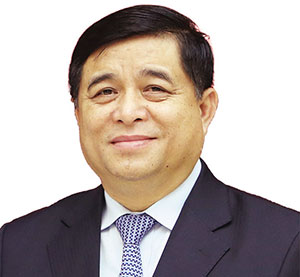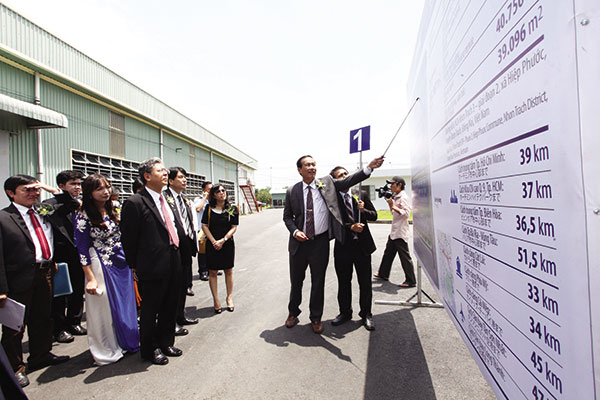Japan visit strengthens bond
 |
What are you expecting from the official visit to Japan by Prime Minister Nguyen Xuan Phuc?
Ever since our two countries forged diplomatic ties in 1973, the Vietnam-Japan bilateral relationship has developed rapidly in many sectors. Vietnam and Japan established their Extensive Strategic Partnership for Peace and Prosperity in March 2014, and have developed a special relationship based on reliability, mutual understanding, and proximity.
When Japan’s Emperor and Empress and Prime Minister Shinzo Abe paid their visits to Vietnam recently, they received a very warm and highly respectful welcome from the Vietnamese people and government. And when Vietnamese high-ranking officials visit Japan, they receive the same welcome and respect from Japan’s people and government.
I would say that this is an important foundation for the two countries to promote their bilateral co-operation.
In this context, the June 4-8 visit by the prime minister will usher in a new chapter in the Vietnam-Japan relationship, with greater mutual understanding and substantial effects on the two countries’ strategic partnership covering many sectors including trade, investment, and development co-operation.
One of the defining elements of the Vietnam-Japan relationship is the connectivity between the two economies, and the strong co-operation in trade and investment. What are you expecting from this co-operation in the future?
Japan is now Vietnam’s biggest bilateral donor, with a total official development assistance (ODA) commitment for Vietnam mounting to $30 billion so far. Japan is also the second largest foreign investor, third largest trade partner, and fourth largest tourism partner of Vietnam.
Japan has also greatly fuelled Vietnam’s infrastructure development and its investment projects have significantly contributed to Vietnam’s socio-economic development.
In addition, Japan has been actively supporting Vietnam in improving its investment and business climate via the implementation of the Vietnam-Japan Joint Initiative, which was launched in 2003 and is now in its sixth phase. Japan has also been helping Vietnam implement its industrialisation strategy within the Vietnam-Japan Co-operation Framework until 2020, and create a vision to 2030. Vietnam highly appreciates this important and effective support. However, room remains for us to lift the two countries’ bilateral relations to new heights.
Japanese investors do not only bring good financial health to the table, but also provide good technologies and modern management models. If these strengths can be combined with Vietnam’s advantages – such as an improved business climate and convenient geographical location – all investors will benefit and Vietnam’s social and economic situation will be able to significantly improve.
While it has become a lower-middle-income country, Vietnam still faces difficulties with its limited resources. The country is also hit by many challenges like climate change and poverty reduction. Thus, it still needs concessional ODA, especially from big partners like Japan. Of course, we have to use ODA in the most effective manner, so that the public debt and national financial security will not be adversely affected.
 |
| Japan is one of the most successful investors in Vietnam, Photo: Le Toan |
During the prime ministerial visit to Japan, Vietnam’s Ministry of Planning and Investment and the Japan External Trade Organization (Jetro) will jointly organise a big investment promotion conference in Japan. Could you please elaborate on the conference?
This will be the biggest-ever investment promotion conference between Vietnam and Japan. The conference has attracted special attention from both sides’ enterprises. Initially, it was expected that about 1,000 enterprises would join the event, but the figure has now increased to over 1,200.
Prime ministers Nguyen Xuan Phuc and Shinzo Abe will also attend and make keynote speeches at the event. Their presence there will fuel confidence and inspire Japanese firms to invest more in Vietnam, based on mutual benefits and the mutual construction of peace, stability, and prosperity in the region and the world.
| Big deals expected in the week Vietnam and Japan are set to sign a slew of co-operation deals during the official visit by Prime Minister Nguyen Xuan Phuc to the Northeast Asian country this week. According to the Ministry of Foreign Affairs (MoFA), during his visit to Japan, PM Phuc and his Japanese counterpart Shinzo Abe will chair the largest Vietnam-Japan business forum ever held, attended by representatives of about 1,200 Vietnamese and Japanese firms. A record number of co-operation deals are expected to be signed at this forum (around 30) worth some $15 billion, in the sectors of foodstuff, agriculture, transport, energy, and environment. Furthermore, ministries and localities of both countries are likely to sign around 10 co-operation documents for official development assistance (ODA), climate change, industry and trade, and culture, sports, and tourism. The two governments will also officially ink a deal in which Japan will grant a large ODA sum to Vietnam. This sum was discussed earlier by Japan’s Prime Minister Shinzo Abe during his official visit to Vietnam in January 2017. Between 1992 and March 2016, Japan committed $29.5 billion in ODA for Vietnam. During his visit to Japan, Prime Minister Nguyen Xuan Phuc will also have several meetings with leaders of Japanese economic and business federations, such as Keidanren and Kankeiren, in a bid to attract more Japanese investment. Japan is now Vietnam’s second largest foreign investor. As of May 20, 2017, it had 3,411 valid investment projects in Vietnam, registered at nearly $43.5 billion. According to the MoFA, the primary purpose of this visit is to “further affirm Vietnam’s consistent policy in attaching great importance to the two countries’ Extensive Strategic Partnership in all sectors”, and to “further boost the two countries’ economic connectivity.” While in Japan, PM Phuc will also attend the 23rd International Conference on The Future of Asia. He will be the keynote speaker at the event, highlighting Vietnam’s contributions and initiatives to Asia’s peace, prosperity, and development, and Vietnam’s firm stance in pursuing trade liberalisation and acting as a responsible member of the international community. |
In April 2017, you paid a working visit to Japan, where you met with leaders of many Japanese groups and corporations. And now, Prime Minister Nguyen Xuan Phuc’s visit will see such a big conference. Do you think that these efforts will create a greater wave of Japanese investment into Vietnam in the time to come?
It must be noted that Japanese firms’ overseas investment stem from their own needs. They want to expand their export markets and seek new investment opportunities. Previously, when investing overseas, they would eye big countries like China, in order to take advantage of their big markets and low labour costs. However, Japanese investors and companies have shifted their investments to other markets like Vietnam. As such, Vietnam should have more opportunities to attract more resources in service of its production, businesses, and development.
However, Japanese firms have also been boosting their investments in other regional markets like Thailand, Indonesia, Myanmar, and the Philippines. So although Vietnam is attractive to Japanese investors, we have to compete with these other markets.
Vietnam has to improve its infrastructure and help investors by removing hurdles in administrative procedures, land access while making better preparations in energy and human resources. Efforts must be made to lure more Japanese investors, and make them think about Vietnam first when they make any decision about overseas investment.
Once Vietnam has a friendlier business climate characterised by transparency and predictability, and with the two countries’ strong strategic partnership in mind, the Vietnam-Japan investment and trade co-operation will be further boosted, and more Japanese firms and investors will come to Vietnam.
What the stars mean:
★ Poor ★ ★ Promising ★★★ Good ★★★★ Very good ★★★★★ Exceptional
Latest News
More News
- EU and Vietnam elevate relations to a comprehensive strategic partnership (January 29, 2026 | 15:22)
- Vietnam to lead trade growth in ASEAN (January 29, 2026 | 15:08)
- Japanese business outlook in Vietnam turns more optimistic (January 28, 2026 | 09:54)
- Foreign leaders extend congratulations to Party General Secretary To Lam (January 25, 2026 | 10:01)
- 14th National Party Congress wraps up with success (January 25, 2026 | 09:49)
- Congratulations from VFF Central Committee's int’l partners to 14th National Party Congress (January 25, 2026 | 09:46)
- 14th Party Central Committee unanimously elects To Lam as General Secretary (January 23, 2026 | 16:22)
- Worldwide congratulations underscore confidence in Vietnam’s 14th Party Congress (January 23, 2026 | 09:02)
- Political parties, organisations, int’l friends send congratulations to 14th National Party Congress (January 22, 2026 | 09:33)
- Press release on second working day of 14th National Party Congress (January 22, 2026 | 09:19)















 Mobile Version
Mobile Version